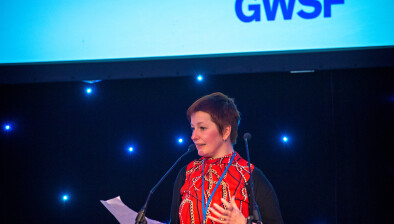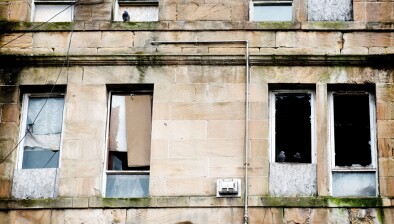Crumbling tenements crisis taking communities ‘back to the 60s’
 The worsening condition of many tenements is a blight on local communities and in some areas feels like a return to the 60s and 70s, a new report out today has warned.
The worsening condition of many tenements is a blight on local communities and in some areas feels like a return to the 60s and 70s, a new report out today has warned.
The report, from the Glasgow and West of Scotland Forum of Housing Associations (GWSF), is being launched at an event at Govanhill Housing Association addressed by first minister Nicola Sturgeon. It says that concerted action is needed from owners themselves and from national and local government, in partnership with local housing associations, to tackle the growing number of badly neglected privately owned tenements.
Sponsored by TC Young, the report estimates that there are over 12,500 sub-standard traditional (pre-1914) tenement flats and 5,000 sub-standard post-1924 flats in or adjacent to areas covered by housing associations which are members of the Forum.
David Bookbinder, GWSF director, said: “Everyone recognises that these are challenging times financially, but for some tenements, if nothing is done, it really will feel that we’ve gone back full circle to the 1960s and 70s.
“In some respects there’s a temptation to say these are privately owned tenements and it’s down to the owners to sort out their own problems. But we know that things can get to a point where housing conditions can blight whole areas.
“We’ve been keen for the report to highlight some constructive partnership working which has been trying to address some of the worst tenements. For example, funding from the Scottish Government and Glasgow City Council has made and will make a big difference to tenements in areas like Govanhill, Dennistoun, Queens Cross and Lochfield Park in Easterhouse. And in Renfrewshire we’re hoping that multi-agency discussions will lead to progress in the foreseeable future.
“Specific funding initiatives are always very welcome. But we believe there’s a strong case for tenemental rehab to become a more mainstream part of the Scottish Government’s new supply programme, as acquiring and doing up tenements genuinely brings new housing for rent, and can be a crucial element of community regeneration.
“We’re keen to engage further with the Scottish Government and local authorities on this issue, and are delighted that the first minister has made time to address our conference in the middle of a busy election campaign.”
First minister Nicola Sturgeon said: “It is right that we make the best use of our existing housing and right that this be provided to a good standard. I am pleased that the condition of homes in Scotland is improving under this government and that is in part down to the hard work of the people working in housing associations across Glasgow and Scotland, all of whom are doing their bit to improve the lives of people in their communities.
“The Scottish House Condition Survey reports that the levels of both urgent and critical disrepair have fallen and the independent Scottish Housing Regulator reported in March that landlords anticipate that 94 per cent of social housing is expected to achieve the Scottish Housing Quality Standard. Hundreds of thousands of homes have been improved by social landlords across Scotland since 2004. That is all good news for tenants and I not only congratulate the sector but want to continue working with them to improve the homes and lives of individuals and families across Scotland.
“Better housing improves lives and we recognise that in some instances further work is needed across the housing stock, which is why we are continuing to do more. We are introducing a Private Sector Tenancies Bill which will help tenants have more stability in their home whilst also giving security to landlords. If you feel safe, comfortable and secure in your home, you can also feel you are part of the community in which you live and look to what you can do to get involved in local community groups or initiatives all of which will improve the standard of living for people across Scotland.”
GWSF’s report can be seen here.







